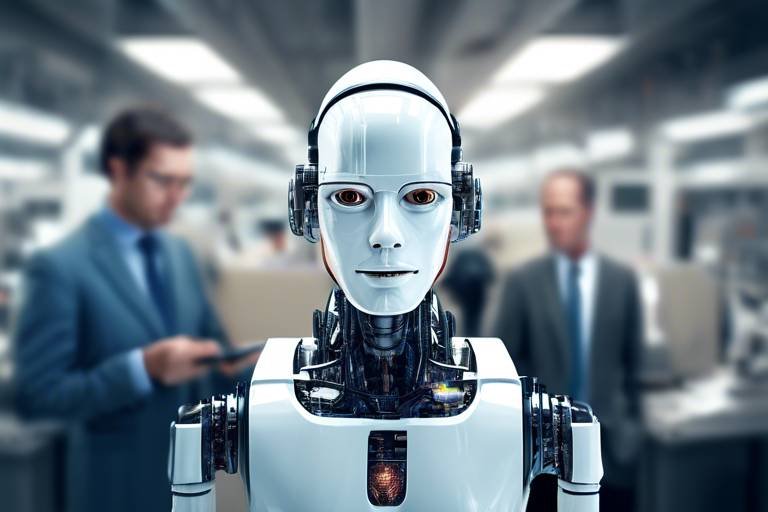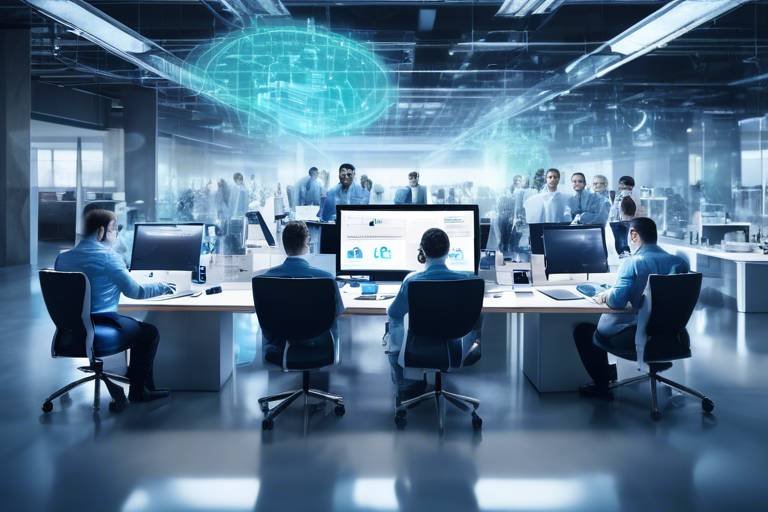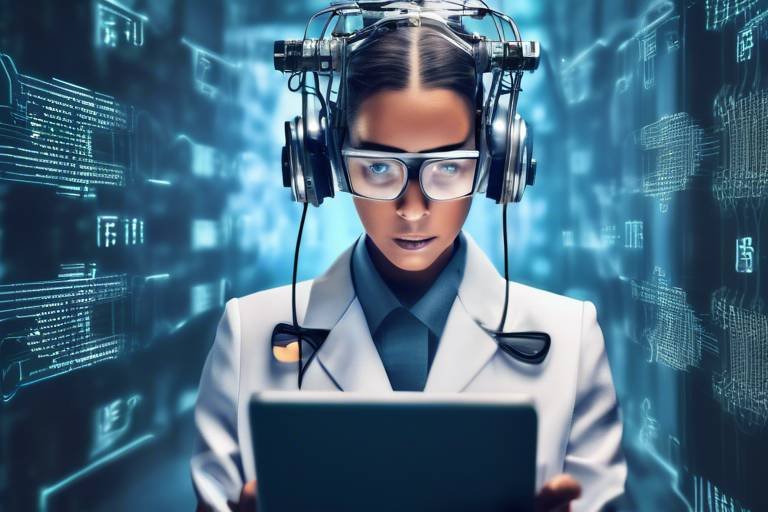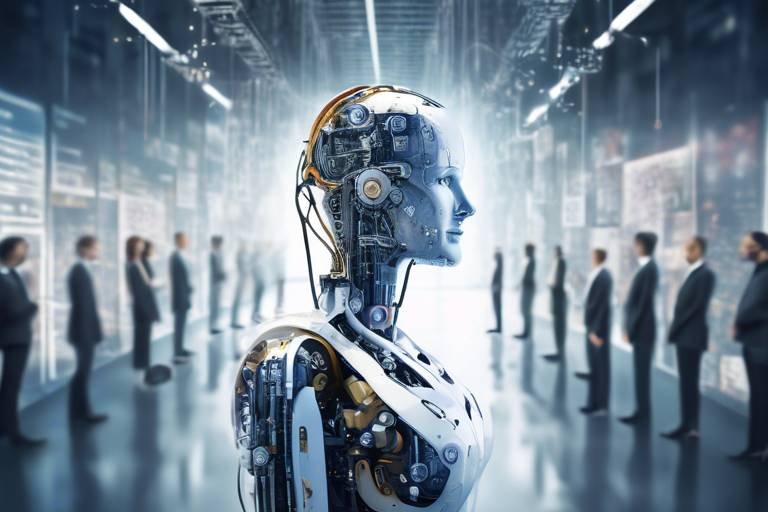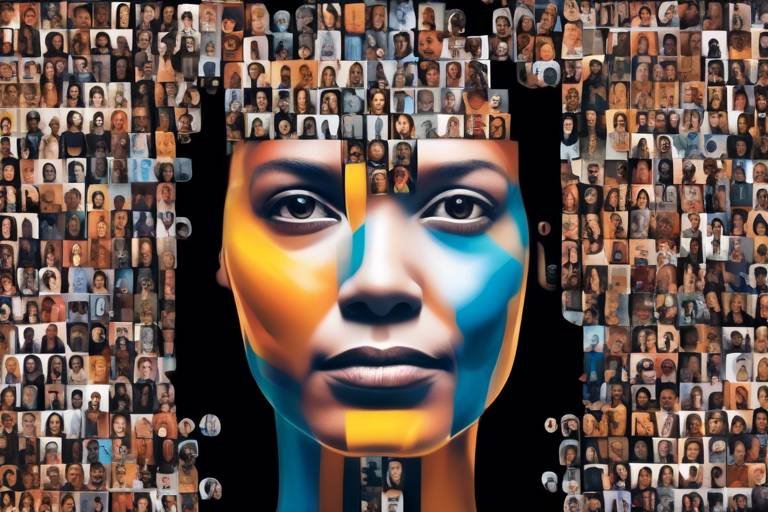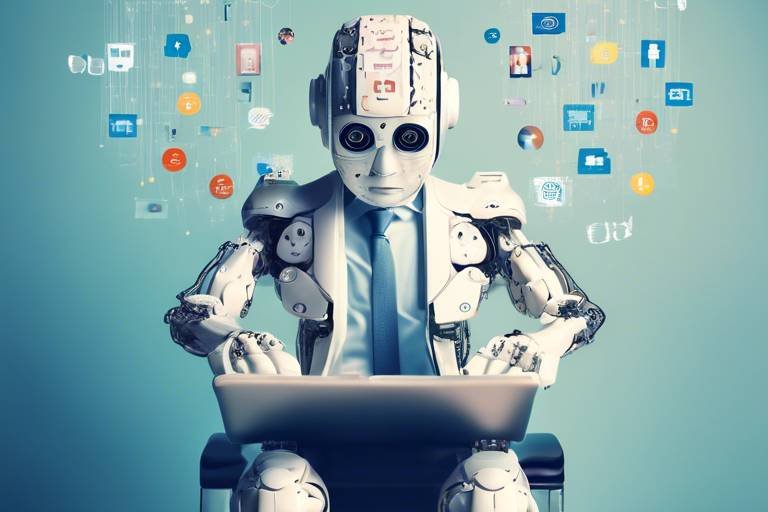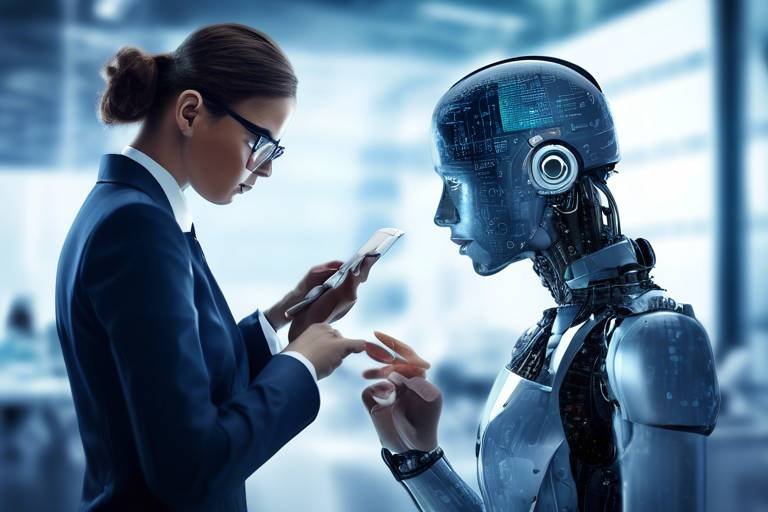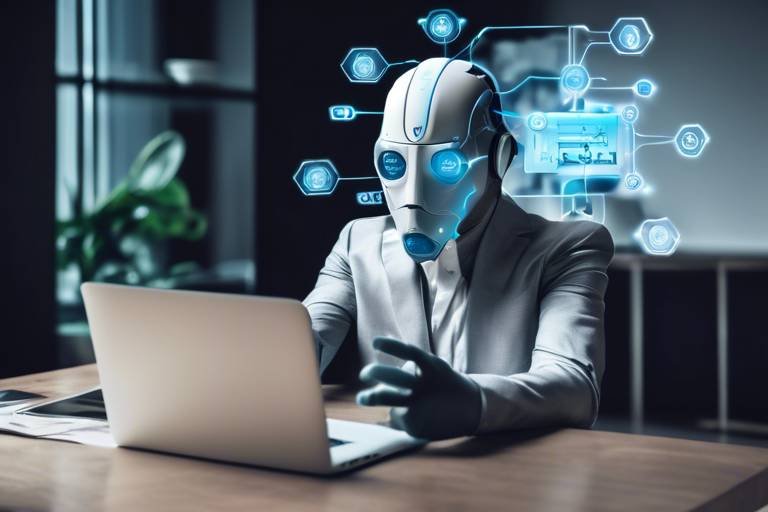Will AI Replace or Assist in Future Jobs?
In today's rapidly evolving world, the question of whether artificial intelligence (AI) will replace or assist in future jobs is more relevant than ever. As technology advances, many people are left wondering what this means for their careers. Will we see a future where machines take over our roles, or will they become our trusted partners in the workplace? This article dives deep into the potential impact of AI on the job market, shedding light on its capabilities and the implications for various industries.
To understand the future of AI in the workforce, we must first look back at its evolution. Over the years, AI has transformed from simple algorithms to complex systems capable of learning and adapting. This evolution has paved the way for AI to perform tasks that were once thought to require human intelligence. As we explore the potential for AI to either replace or assist human roles, it's crucial to consider not just the technology itself, but also the human element involved in work.
As we navigate this topic, we must also consider the emotional and social aspects of work. Many individuals find purpose and identity in their jobs, and the idea of being replaced by a machine can evoke feelings of anxiety and uncertainty. So, let's take a closer look at the impact of AI on various job sectors and what the future may hold for the workforce.
Understanding how AI has developed over the years provides insight into its current capabilities and future implications for job roles across different sectors. Initially, AI was limited to performing basic tasks, but advancements in machine learning and natural language processing have enabled it to tackle more complex challenges. For instance, AI can now analyze vast amounts of data, recognize patterns, and even engage in conversations with users.
As AI continues to evolve, it's essential to recognize that its integration into the workplace is not merely about replacing jobs. Instead, it presents an opportunity for workers to adapt and grow. By embracing AI as a tool rather than a threat, employees can enhance their skills and increase their value in the job market. This shift in mindset is crucial as we move forward into an AI-driven future.
When discussing AI's impact on jobs, one cannot ignore the concept of job automation. Certain roles are more susceptible to automation, particularly those that involve repetitive tasks or predictable workflows. Industries such as manufacturing, data entry, and customer service are prime examples where AI is likely to take over specific functions. However, it's essential to remember that while some jobs may be at risk, others will likely emerge as a result of this technological shift.
Certain jobs, particularly those involving repetitive tasks, are at a higher risk of being replaced by AI. This subsection delves into which professions may face the greatest threats. For example, consider the following sectors:
- Manufacturing and Assembly Lines: Automation has already made significant inroads in manufacturing, with robots performing tasks such as welding, painting, and assembly. This transformation raises questions about the future of human workers in these roles.
- Data Entry and Administrative Roles: Jobs that involve data entry, scheduling, and basic administrative tasks are increasingly being automated. AI can streamline these processes, leading to potential job losses in these areas.
Manufacturing jobs are increasingly being automated. This part discusses how AI technologies are transforming production lines and the implications for workers. Robotics and AI systems can operate 24/7, leading to increased efficiency and reduced labor costs. However, the downside is that many workers may find themselves displaced as machines take over their roles. It's a classic case of progress vs. people.
Administrative tasks such as data entry are prime candidates for automation. This section explores how AI can streamline these processes and the potential job losses involved. For instance, AI-driven software can process invoices, manage schedules, and even respond to customer inquiries, all with minimal human intervention. While this can improve efficiency, it also raises concerns about the future of administrative jobs.
Conversely, some jobs are less likely to be replaced by AI. Roles that require human empathy, creativity, and complex decision-making are generally considered low-risk for automation. Professions such as healthcare, education, and creative industries rely heavily on human interaction and emotional intelligence, making them less susceptible to AI takeover.
Rather than replacing jobs, AI may serve as an assistant, augmenting human capabilities and improving productivity in various fields. This section explores collaborative roles where AI and humans can work together to achieve better outcomes. For instance, AI can assist doctors in diagnosing diseases by analyzing patient data, allowing healthcare professionals to make more informed decisions.
AI tools can help workers accomplish tasks more efficiently. This part discusses how AI can enhance productivity and the skills needed to leverage these technologies effectively. For example, AI can automate mundane tasks, freeing up time for employees to focus on more strategic and creative aspects of their work. The key is to view AI as a partner rather than a competitor.
As AI evolves, new job categories are emerging. This subsection highlights the types of roles that may arise from the integration of AI into various industries. Positions such as AI trainers, data analysts, and AI ethicists are becoming increasingly important as organizations seek to harness the power of AI responsibly. These new roles offer exciting opportunities for those willing to adapt and learn.
Q: Will AI take away all jobs?
A: While AI will automate certain tasks, it is unlikely to take away all jobs. Instead, it may lead to the creation of new roles that require human skills.
Q: What skills should I develop to stay relevant in the job market?
A: Focus on developing skills that AI cannot easily replicate, such as creativity, emotional intelligence, and complex problem-solving.
Q: How can I prepare for the changes brought by AI?
A: Stay informed about AI developments, seek training in relevant technologies, and be open to adapting your skill set.

The Evolution of AI in the Workplace
Artificial Intelligence (AI) has come a long way since its inception, evolving from simple algorithms to complex systems capable of learning and adapting. In the early days, AI was primarily about rule-based systems that could perform specific tasks, such as playing chess or solving mathematical problems. However, as technology has progressed, we now find ourselves in an era where AI can analyze vast amounts of data, recognize patterns, and even engage in natural language processing. This evolution has not only changed the way we interact with machines but has also reshaped the workplace landscape.
To understand the current capabilities of AI, it's essential to look at its developmental milestones. Here are some key phases in the evolution of AI:
| Year | Milestone |
|---|---|
| 1956 | Birth of AI as a field at the Dartmouth Conference. |
| 1997 | IBM's Deep Blue defeats chess champion Garry Kasparov. |
| 2011 | IBM's Watson wins Jeopardy! against human champions. |
| 2020 | AI models like GPT-3 demonstrate advanced language understanding. |
The rise of machine learning and deep learning has been particularly significant. These technologies allow AI systems to learn from data, improving their performance over time without explicit programming. This capability has opened doors to applications in various industries, from healthcare to finance, enabling AI to assist in tasks ranging from diagnostics to fraud detection.
Moreover, the integration of AI into the workplace has sparked a cultural shift in how we perceive jobs and productivity. Companies are increasingly adopting AI tools to enhance operational efficiency, reduce costs, and improve decision-making processes. For instance, AI-driven analytics can provide insights that help businesses understand market trends, customer behavior, and operational bottlenecks.
However, this evolution raises important questions about the future of work. Will AI complement human workers, or will it render certain jobs obsolete? As we delve deeper into this topic, it becomes clear that the relationship between AI and the workforce is complex. While some roles may be at risk of automation, others are likely to evolve, requiring new skills and competencies.
As we continue to explore the implications of AI in the workplace, it’s essential to recognize that this technology is not just a tool for efficiency; it’s a catalyst for change. Organizations must adapt to these advancements, fostering a culture of continuous learning and flexibility to ensure that both AI and human workers can thrive together.
- Will AI completely replace human jobs? While AI may automate some tasks, it is more likely to augment human roles rather than completely replace them.
- What industries are most affected by AI? Industries such as manufacturing, finance, and customer service are seeing significant impacts from AI technologies.
- How can workers prepare for an AI-driven workplace? Workers can enhance their skills in areas that AI cannot replicate, such as creativity, emotional intelligence, and complex problem-solving.

AI and Job Automation
As we dive into the world of artificial intelligence (AI) and its influence on the job market, it's crucial to understand the concept of job automation. Job automation refers to the use of technology to perform tasks that were traditionally done by human workers. With advancements in AI, we are witnessing a significant shift in how certain jobs are performed, leading to both excitement and concern among the workforce. So, what does this mean for the future of work? Will robots take over our jobs, or will they merely assist us in our roles?
AI has already begun to automate various tasks across multiple industries, transforming the way we approach work. In sectors such as manufacturing, customer service, and even healthcare, AI technologies are streamlining processes, reducing costs, and increasing efficiency. For instance, AI systems can analyze vast amounts of data far quicker than a human ever could, allowing for faster decision-making and improved outcomes. However, this efficiency often comes at a cost: the potential displacement of human workers.
It's essential to recognize that not all jobs are created equal when it comes to automation. Some roles are particularly vulnerable due to their repetitive nature or reliance on routine tasks. For example, jobs in the following areas are at a higher risk of automation:
- Manufacturing: Assembly line jobs are increasingly being taken over by robots that can perform tasks with precision and speed.
- Data Entry: Tasks that involve inputting information into databases are prime candidates for automation, as AI can handle this more efficiently.
- Customer Service: Chatbots and virtual assistants are stepping in to handle basic customer inquiries, reducing the need for human representatives.
However, while many jobs may face automation, it's important to highlight that not all sectors are equally affected. Some professions, particularly those that require human empathy, creativity, and complex decision-making, are less likely to be replaced. For instance, roles in healthcare, education, and creative industries demand a human touch that AI simply cannot replicate.
Moreover, the impact of AI on job automation is not solely about replacement; it also involves the transformation of existing roles. Many jobs will evolve, requiring workers to adapt and learn new skills to work alongside AI technologies. This dynamic creates a unique opportunity for individuals to enhance their careers by acquiring skills that complement AI capabilities.
In summary, AI is set to reshape the job landscape significantly. While it may automate certain tasks, it also opens the door for new opportunities and roles that we can't yet imagine. As we move forward, it will be crucial for both workers and employers to adapt to these changes, embracing the potential of AI while also addressing the challenges it presents. The question remains: Are we ready to embrace this new era of work?
Q: Will AI completely replace human jobs?
A: While AI will automate certain tasks, it is unlikely to completely replace all human jobs. Many positions will evolve, requiring new skills and collaboration with AI technologies.
Q: What types of jobs are most at risk of automation?
A: Jobs that involve repetitive tasks, such as manufacturing and data entry, are most at risk. However, roles requiring human empathy and creativity are less likely to be replaced.
Q: How can workers prepare for the changes brought by AI?
A: Workers can prepare by acquiring new skills, particularly those that complement AI technologies, and staying informed about industry trends and advancements.

High-Risk Occupations
The rise of artificial intelligence (AI) is reshaping the job landscape, and some occupations are feeling the heat more than others. As we delve into the realm of , it's crucial to recognize that jobs involving repetitive tasks and predictable patterns are at the forefront of this transformation. Imagine a factory assembly line where machines can perform tasks with precision and speed that far surpass human capabilities. It's not just a scene from a science fiction movie; it's a reality that many workers face today.
In various sectors, certain roles are particularly vulnerable to automation. For instance, consider the manufacturing industry, where robots are increasingly taking over tasks that once required human hands. The efficiency and consistency that AI brings to production lines are undeniable, but this shift also raises significant concerns about job security for workers in these fields. According to recent studies, it is estimated that up to 60% of manufacturing jobs could be automated within the next two decades. This statistic is alarming, as it highlights the urgency for workers to adapt and reskill for the future.
Moreover, jobs in data entry and administrative roles are also prime candidates for AI takeover. These positions often involve tedious tasks such as sorting data, filling out forms, and managing schedules—activities that can easily be streamlined through automation. AI systems can process vast amounts of information in mere seconds, reducing the need for human intervention. As companies strive for greater efficiency, the risk of job losses in these areas continues to grow.
To illustrate the impact of AI on high-risk occupations, let's take a closer look at a few specific roles:
| Occupation | Risk Level | Reason for Automation |
|---|---|---|
| Manufacturing Worker | High | Repetitive tasks, efficiency |
| Data Entry Clerk | High | High volume, low complexity |
| Telemarketer | Moderate | Predictable scripts, automation of responses |
| Cashier | Moderate | Self-checkout systems, efficiency |
While the automation of these roles can lead to increased productivity for companies, it also poses a significant challenge for workers who must adapt to an ever-changing job market. The question remains: how can individuals prepare for a future where AI may replace their current roles? Reskilling and upskilling are essential strategies for navigating this shift. Workers should focus on developing skills that are less likely to be automated, such as empathy, creativity, and complex problem-solving. These human-centric skills will be invaluable in an increasingly automated world.
In conclusion, as we explore the landscape of high-risk occupations, it's clear that AI is not merely a futuristic concept; it is a present-day reality that demands our attention. By understanding which jobs are at risk and taking proactive steps to adapt, workers can better position themselves for success in the evolving job market.
- Will AI completely replace human jobs? While AI may automate certain tasks, it is more likely to assist workers rather than replace them entirely.
- What types of jobs are safe from AI automation? Jobs that require human interaction, creativity, and complex decision-making are generally less likely to be automated.
- How can workers prepare for the changes brought by AI? Reskilling and upskilling in areas that AI cannot easily replicate, such as emotional intelligence and critical thinking, are essential.

Manufacturing and Assembly Lines
The landscape of is undergoing a seismic shift thanks to the advent of artificial intelligence (AI). Once dominated by human labor, these sectors are increasingly embracing automation, which raises an important question: what does this mean for the future of jobs in these industries? As AI technologies evolve, they are not just enhancing productivity; they are also redefining the roles of workers on the assembly line.
Imagine walking into a factory where robots are seamlessly working alongside humans, performing tasks with precision and speed that far exceed human capabilities. This scenario is becoming a reality as AI-powered machines take on repetitive tasks, allowing human workers to focus on more complex and creative responsibilities. For example, AI can now handle tasks such as quality control, inventory management, and even predictive maintenance. By analyzing data in real-time, AI can identify potential issues before they become significant problems, thereby reducing downtime and increasing efficiency.
However, this shift towards automation does not come without its challenges. Many workers in manufacturing roles may find themselves facing job displacement as AI systems take over tasks traditionally performed by humans. According to a report by the World Economic Forum, it is estimated that by 2025, 85 million jobs may be displaced by the shift to machines and algorithms. Yet, it’s essential to recognize that while some jobs may vanish, new opportunities are also emerging. The demand for skilled workers who can operate, maintain, and improve these AI systems is on the rise.
To put this into perspective, let’s consider a few key areas where AI is making a significant impact in manufacturing:
| AI Application | Impact on Manufacturing |
|---|---|
| Robotic Automation | Increased efficiency and reduced labor costs |
| Predictive Analytics | Minimized downtime and optimized maintenance schedules |
| Supply Chain Optimization | Improved inventory management and reduced waste |
As we delve deeper into the future of manufacturing, it becomes clear that AI is not merely a replacement for human workers but rather a tool that can enhance their capabilities. Workers who are willing to adapt and learn how to work alongside AI will find that their roles evolve into more strategic positions, focusing on innovation and problem-solving rather than repetitive tasks. In this new era, human creativity and intuition will complement AI's efficiency, leading to a more productive and dynamic manufacturing environment.
In conclusion, while the rise of AI in manufacturing and assembly lines presents challenges, it also opens doors to new possibilities. Embracing this technology can lead to a more efficient, innovative, and ultimately more human-centric approach to manufacturing. The key lies in adapting to change and leveraging AI as a partner rather than viewing it solely as a threat.
- Will AI completely replace human workers in manufacturing? - While AI will automate many tasks, it will also create new roles that require human skills.
- What skills will be important for workers in the AI-driven manufacturing sector? - Skills in data analysis, machine operation, and problem-solving will be crucial.
- How can workers prepare for the changes brought by AI? - Continuous learning and upskilling in technology and automation will be essential for workers to thrive.

Data Entry and Administrative Roles
In today's fast-paced digital world, are becoming increasingly vulnerable to the advancements of artificial intelligence. These positions often involve repetitive tasks that can be easily automated, making them prime candidates for AI intervention. Imagine a world where mundane tasks like entering data into spreadsheets or managing schedules are handled by intelligent algorithms, freeing up human workers to focus on more strategic and creative endeavors. This shift is not just a possibility; it's already happening!
AI technologies, such as machine learning and natural language processing, are being integrated into software solutions that can perform data entry with remarkable speed and accuracy. For instance, Optical Character Recognition (OCR) allows AI systems to scan documents and extract relevant information without human intervention. This means that what once took hours of manual labor can now be accomplished in a fraction of the time, significantly reducing operational costs for businesses.
However, while the efficiency gains are impressive, they come with a downside. Many administrative professionals may find their roles diminished or entirely eliminated as companies adopt these technologies. According to a recent study, it is estimated that up to 40% of administrative jobs could be automated in the next decade. This statistic raises an important question: what will happen to the people currently employed in these roles?
To navigate this changing landscape, workers in data entry and administrative positions must adapt. Here are some skills that can help them stay relevant:
- Technical Proficiency: Familiarity with AI tools and software is crucial. Understanding how to leverage these technologies can make workers indispensable.
- Analytical Skills: The ability to interpret data and make informed decisions based on insights derived from AI systems will be highly valued.
- Soft Skills: Skills like communication, empathy, and teamwork will remain essential, as they are difficult for AI to replicate.
In conclusion, while AI poses a significant threat to data entry and administrative roles, it also presents opportunities for those willing to adapt. By embracing new technologies and enhancing their skill sets, workers can not only survive but thrive in an increasingly automated world. The future may look daunting, but with the right approach, it can also be filled with new possibilities and exciting challenges.
Q: Will AI completely eliminate data entry jobs?
A: While AI will automate many aspects of data entry, it is unlikely to eliminate all jobs. Workers who adapt and learn to work alongside AI will find new opportunities.
Q: What skills should I focus on to remain competitive in the job market?
A: Focus on technical skills related to AI tools, analytical skills for data interpretation, and soft skills that enhance teamwork and communication.
Q: How can I prepare for the changes brought by AI?
A: Stay informed about AI developments in your field, seek training in relevant technologies, and be open to learning new skills.

Low-Risk Occupations
While the rise of artificial intelligence (AI) raises concerns about job loss in many sectors, it's essential to recognize that not all occupations face the same level of risk. typically involve tasks that require a high degree of human interaction, creativity, and complex decision-making. These roles are less likely to be automated because they rely on empathy, critical thinking, and nuanced understanding of human emotions—qualities that AI has yet to master.
For instance, professions in healthcare, education, and creative industries are often considered safe havens in the age of AI. Think about it: can a robot truly replace the warmth of a nurse comforting a patient or the insight of a teacher guiding a student through complex concepts? These roles demand a human touch that machines simply cannot replicate. In fact, according to a recent report by the World Economic Forum, jobs that require social intelligence and emotional intelligence are projected to grow significantly in the coming years.
Moreover, there are various low-risk occupations that are likely to thrive alongside AI advancements. These include:
- Healthcare Professionals: Doctors, nurses, and therapists will continue to play crucial roles in patient care, relying on their ability to connect with patients on a personal level.
- Creative Roles: Artists, writers, and designers will always be needed to create original content and innovative designs that resonate with human experiences.
- Human Resources Specialists: HR professionals will remain essential in managing workplace culture, resolving conflicts, and fostering employee engagement.
- Education Professionals: Teachers and educators will continue to be instrumental in shaping the minds of future generations, adapting their teaching methods to suit individual learning styles.
These roles exemplify how human skills can complement AI rather than compete with it. The integration of AI into these fields can lead to enhanced productivity, allowing professionals to focus on what they do best—connecting with people, solving problems, and fostering creativity. As AI takes over mundane tasks, it frees up time for individuals in low-risk occupations to engage in more meaningful and impactful work.
In summary, while AI continues to advance rapidly, many occupations will remain resilient due to their inherent need for human qualities. Rather than fearing AI, professionals in these fields should embrace it as a tool that can enhance their work and create new opportunities for collaboration.
1. Will AI completely take over low-risk jobs?
No, AI is unlikely to completely take over low-risk jobs that require human empathy, creativity, and complex decision-making. Instead, it may augment these roles, allowing professionals to focus on more impactful tasks.
2. What types of jobs are considered low-risk in the age of AI?
Low-risk jobs typically include healthcare professionals, educators, creative roles, and human resources specialists, as they rely heavily on human interaction and emotional intelligence.
3. How can professionals in low-risk occupations leverage AI?
Professionals can leverage AI tools to automate mundane tasks, enhance productivity, and improve their decision-making processes, allowing them to focus on more critical aspects of their roles.
4. Are there new job opportunities emerging due to AI?
Yes, as AI continues to evolve, new job categories are emerging, particularly in fields like AI ethics, data analysis, and technology management, which will require a blend of human skills and technical knowledge.

AI as a Job Assistant
In a world increasingly dominated by technology, the notion that artificial intelligence could become a mere replacement for human labor is slowly fading. Instead, we are witnessing a remarkable transformation where AI emerges as a powerful assistant in the workplace. Imagine having a colleague who never tires, works at lightning speed, and can process vast amounts of data in seconds. Sounds like a dream, right? Well, that’s the reality we’re stepping into. AI is not just a tool; it’s a partner that complements our skills and enhances our capabilities.
One of the most significant advantages of AI as a job assistant is its ability to enhance human productivity. Picture this: you're buried under a mountain of emails, reports, and deadlines. Suddenly, an AI tool swoops in, sorting your emails, drafting responses, and even scheduling your meetings. This isn’t science fiction; it’s happening now. By automating mundane tasks, AI allows us to focus on what truly matters—creative thinking, problem-solving, and building relationships with clients. It’s like having a personal assistant who knows your preferences and can anticipate your needs.
Moreover, AI tools are designed to learn and adapt. The more you use them, the better they become at understanding your work style. For instance, in the field of customer service, AI chatbots can handle routine inquiries, freeing up human agents to tackle complex issues that require a personal touch. This collaboration not only improves efficiency but also enhances customer satisfaction. After all, who wouldn’t prefer a quick response to a simple question rather than waiting for a human agent to become available?
Another exciting aspect of AI as a job assistant is its potential to create new job opportunities. As companies integrate AI into their operations, they will require a new breed of professionals to manage, maintain, and improve these systems. Roles such as AI trainers, who teach AI algorithms to understand human language and emotions, or data analysts, who interpret AI-generated insights, are becoming increasingly vital. This shift means that while some jobs may vanish, others will emerge, requiring a different set of skills. It’s a bit like the industrial revolution; while some jobs were lost, many others were created in the process.
To make the most out of AI as a job assistant, it’s essential to foster a culture of continuous learning. Employees should be encouraged to upskill and adapt to the changing landscape. Companies can facilitate this by providing training programs that focus on both technical skills and soft skills like communication and emotional intelligence. After all, the most successful workplaces will be those that blend the efficiency of AI with the irreplaceable human touch.
In conclusion, the future of work is not about AI replacing humans but rather about AI working alongside us. By embracing AI as an assistant, we can unlock new levels of productivity and creativity. The key lies in our willingness to adapt and learn, ensuring that we remain at the forefront of this technological revolution. So, are you ready to welcome AI into your workspace? The possibilities are endless!
- Will AI completely replace human jobs? While AI will automate certain tasks, it is more likely to serve as an assistant, enhancing human capabilities rather than replacing them.
- What types of jobs are most at risk from AI? Jobs that involve repetitive tasks, such as data entry and assembly line work, are more susceptible to automation.
- How can I prepare for a future with AI in the workplace? Focus on developing skills that AI cannot easily replicate, such as creativity, emotional intelligence, and complex problem-solving.
- Are new job opportunities being created by AI? Yes, as AI technology evolves, new roles are emerging, including AI trainers and data analysts.

Enhancing Human Productivity
In today's fast-paced world, the integration of artificial intelligence (AI) into the workplace is not just a trend; it's a revolution. Imagine having a personal assistant who never sleeps, never takes a break, and can process information at lightning speed. That's what AI brings to the table! By automating mundane tasks, AI allows human workers to focus on what they do best—think creatively, solve complex problems, and connect with others on a personal level.
For instance, consider a marketing team juggling multiple campaigns. With AI tools, they can analyze vast amounts of data to identify trends and customer preferences. This means less time spent on repetitive analysis and more time crafting compelling stories that resonate with their audience. It's like having a superpower that enhances your natural abilities. Instead of being overwhelmed by data, marketers can now make informed decisions faster and with greater confidence.
Moreover, AI can assist in project management by scheduling meetings, sending reminders, and even predicting potential project delays based on historical data. This not only streamlines operations but also fosters a collaborative environment. Teams can communicate more effectively when they are not bogged down by administrative tasks. Imagine walking into a meeting fully prepared, thanks to AI's ability to gather and present relevant information beforehand. It's a game-changer!
However, it's essential to remember that AI is not here to replace human intuition and creativity. Instead, it serves as a powerful ally. For example, in fields like healthcare, AI can analyze patient data to suggest diagnoses, but the final decision rests with the healthcare professional. This collaboration enhances the accuracy of medical decisions while allowing doctors to spend more time with patients, ultimately improving care.
As we look to the future, the skills required to thrive in an AI-augmented workplace will evolve. Workers will need to embrace technology and learn how to leverage AI tools effectively. This includes understanding data analytics, machine learning basics, and how to interpret AI-generated insights. The workplace of tomorrow will not just demand technical skills but also a deep understanding of collaboration between humans and machines.
In summary, AI is not just about automation; it's about . By taking over repetitive tasks, providing data-driven insights, and facilitating better communication, AI empowers workers to unleash their full potential. The future is bright for those who adapt and embrace this technology, as it opens doors to new opportunities and innovative ways of working.
- Will AI take away jobs? While some jobs may be automated, AI is also expected to create new roles that require human skills.
- How can I prepare for an AI-driven workplace? Focus on enhancing your technical skills, understanding AI tools, and developing soft skills like creativity and empathy.
- What industries will benefit the most from AI? Industries such as healthcare, finance, marketing, and manufacturing are likely to see significant improvements in productivity through AI integration.

New Job Opportunities Created by AI
As we navigate the evolving landscape of artificial intelligence, it's essential to recognize that while some jobs may be at risk, AI also opens the door to a plethora of new job opportunities. Think of it like a garden: as some plants wither away, new ones sprout, bringing fresh life and diversity. The integration of AI into various industries is not just about replacing human roles, but rather about enhancing and creating positions that were previously unimaginable.
One of the most exciting aspects of AI's growth is its ability to generate roles that focus on collaboration between humans and machines. For instance, as AI systems become more sophisticated, the demand for skilled professionals who can design, manage, and maintain these technologies is on the rise. This leads to the emergence of positions such as AI trainers, who are responsible for teaching AI systems how to interpret data and make decisions, ensuring they align with human values and ethics.
Moreover, the rise of AI has sparked a need for data scientists and machine learning engineers. These roles require individuals who can analyze vast amounts of data and develop algorithms that improve AI performance. As businesses increasingly rely on data-driven insights, the demand for these skilled professionals will continue to grow. In fact, according to a recent report, the data science field is projected to grow by over 30% in the next few years, underscoring the importance of this skill set.
Another fascinating area where AI is creating job opportunities is in the realm of ethical AI development. As companies strive to implement AI responsibly, they need experts who can navigate the complex ethical landscape. This includes roles such as AI ethicists and compliance officers, who ensure that AI applications adhere to legal standards and ethical guidelines. These positions are crucial for maintaining public trust and ensuring that AI technologies are used for the greater good.
Additionally, AI is paving the way for new roles in customer experience management. With the rise of chatbots and virtual assistants, businesses are looking for professionals who can design and optimize these AI-driven tools to enhance customer interactions. This means that roles in user experience (UX) design and customer journey mapping are becoming increasingly valuable, as companies seek to provide seamless and engaging experiences for their clients.
To summarize, while the conversation around AI often centers on job displacement, it is equally important to acknowledge the myriad of opportunities it presents. From AI trainers to data scientists and ethical compliance officers, the job market is evolving in ways that can lead to a more innovative and dynamic workforce. Embracing this change is not just about adapting to new technology; it’s about seizing the chance to shape the future of work.
- Will AI take my job? - While AI may automate certain tasks, it also creates new job opportunities that require human skills.
- What skills will be in demand in the future? - Skills in data analysis, AI management, and ethical compliance are expected to be highly sought after.
- How can I prepare for a career in AI? - Consider pursuing courses in data science, machine learning, and ethics in technology.
Frequently Asked Questions
- Will AI completely replace human jobs?
While AI is expected to automate certain tasks, it is unlikely to completely replace human jobs. Many roles will evolve, requiring humans to work alongside AI, enhancing productivity rather than being replaced.
- What types of jobs are most at risk of being automated?
Jobs that involve repetitive tasks, such as those in manufacturing, data entry, and basic administrative roles, are at a higher risk of automation. These positions often require minimal human interaction and can be efficiently handled by AI.
- Are there jobs that AI cannot replace?
Absolutely! Jobs that require creativity, emotional intelligence, and complex decision-making, such as those in healthcare, education, and creative industries, are less likely to be replaced by AI.
- How can AI serve as an assistant in the workplace?
AI can assist by automating mundane tasks, providing data analysis, and offering insights that help workers make informed decisions. This allows employees to focus on more strategic and creative aspects of their jobs.
- What new job opportunities might arise due to AI?
As AI technology advances, new roles are emerging, such as AI trainers, data analysts, and ethical AI specialists. These positions focus on managing and improving AI systems, ensuring they work effectively and ethically.
- How can workers prepare for an AI-driven job market?
Workers can prepare by developing skills that complement AI, such as critical thinking, emotional intelligence, and technical skills related to AI tools. Continuous learning and adaptability will be key to thriving in this evolving landscape.
- Is AI a threat to job security?
While AI poses challenges to certain job roles, it also creates opportunities for growth and innovation. By embracing AI as a tool rather than a threat, workers can enhance their job security and career prospects.

